The Role of Nursing in Reducing Healthcare Inequality
VerifiedAdded on 2020/05/08
|6
|1267
|49
Essay
AI Summary
Despite notable improvements in healthcare among the Australian population, significant inequalities persist, posing challenges to the common good and human dignity. These disparities are evident across various dimensions such as socioeconomic status, geographic location, education, occupation, and income, leading to unequal access to healthcare services. The essay underscores the intense struggle within Australian healthcare between urban and rural communities in accessing quality care, highlighting issues of marginalization and increased disease burden among disadvantaged groups. It points out that the allocation of healthcare resources disproportionately favors urban areas, leaving rural populations underserved. Furthermore, cultural competence and addressing social determinants are identified as crucial for reducing ethnic and racial health disparities. The essay argues for a pivotal role of nursing in mitigating these inequalities through advocacy, education, and policy influence to promote equitable healthcare access and outcomes. By embracing diversity and focusing on the common good, nurses can lead efforts to create a more inclusive and just healthcare system.
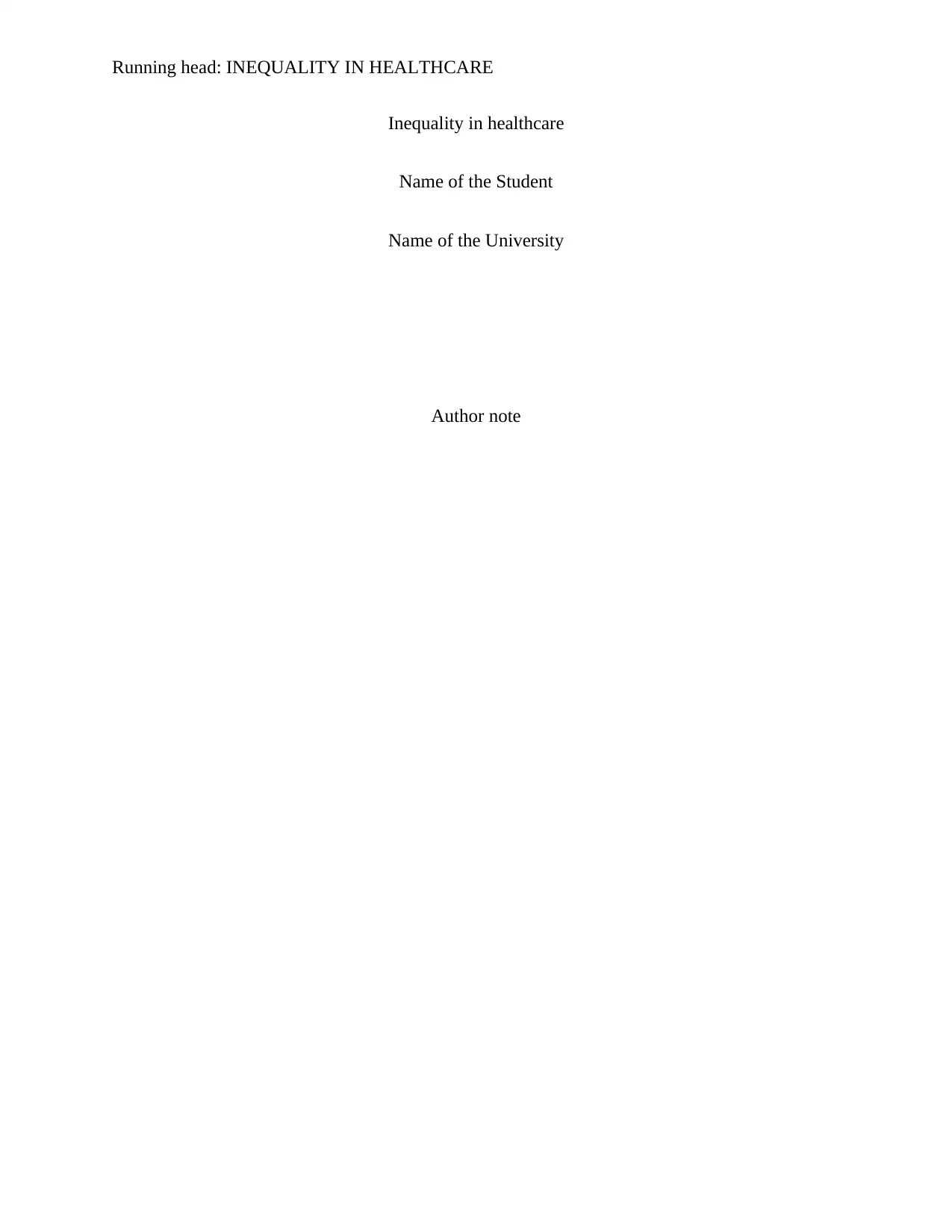
Running head: INEQUALITY IN HEALTHCARE
Inequality in healthcare
Name of the Student
Name of the University
Author note
Inequality in healthcare
Name of the Student
Name of the University
Author note
Paraphrase This Document
Need a fresh take? Get an instant paraphrase of this document with our AI Paraphraser
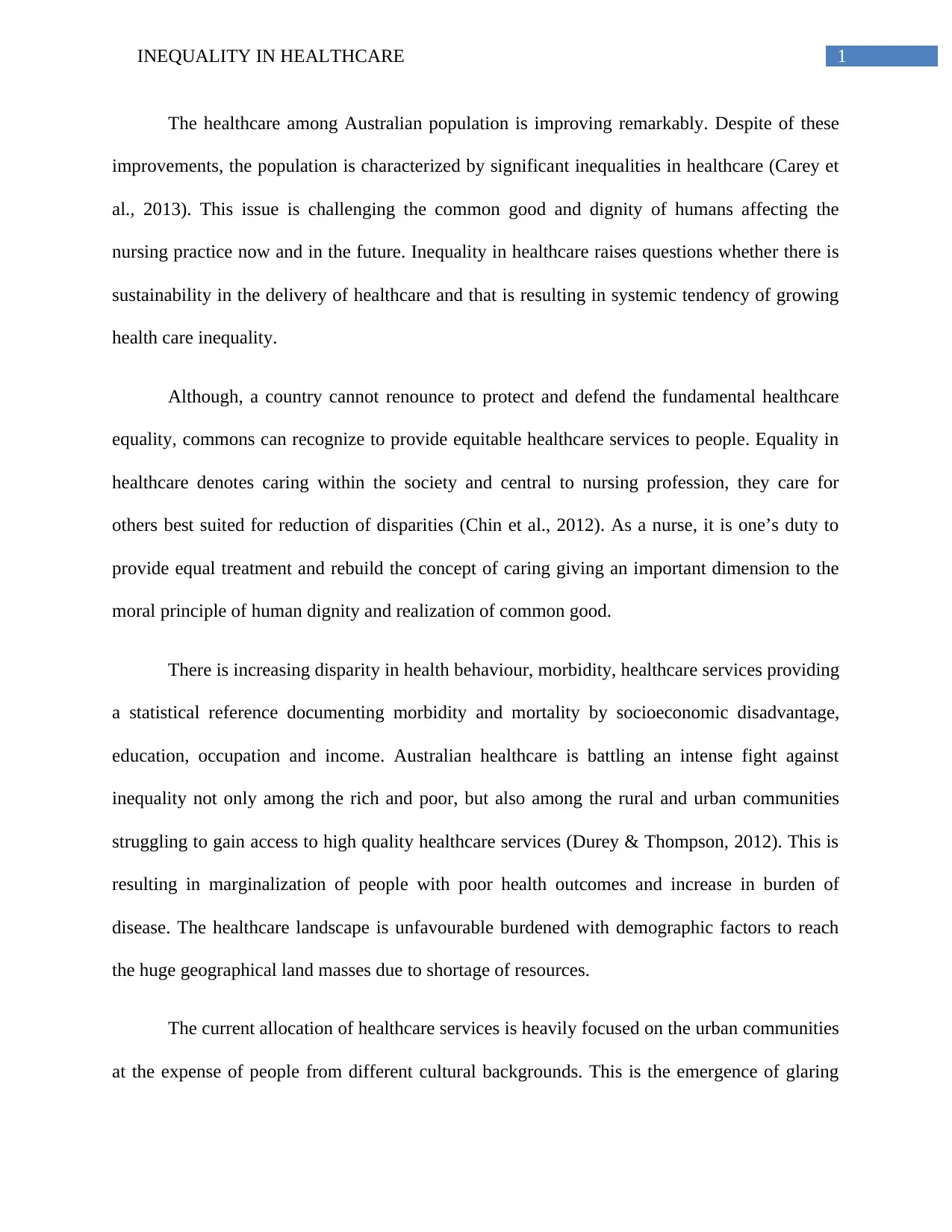
1INEQUALITY IN HEALTHCARE
The healthcare among Australian population is improving remarkably. Despite of these
improvements, the population is characterized by significant inequalities in healthcare (Carey et
al., 2013). This issue is challenging the common good and dignity of humans affecting the
nursing practice now and in the future. Inequality in healthcare raises questions whether there is
sustainability in the delivery of healthcare and that is resulting in systemic tendency of growing
health care inequality.
Although, a country cannot renounce to protect and defend the fundamental healthcare
equality, commons can recognize to provide equitable healthcare services to people. Equality in
healthcare denotes caring within the society and central to nursing profession, they care for
others best suited for reduction of disparities (Chin et al., 2012). As a nurse, it is one’s duty to
provide equal treatment and rebuild the concept of caring giving an important dimension to the
moral principle of human dignity and realization of common good.
There is increasing disparity in health behaviour, morbidity, healthcare services providing
a statistical reference documenting morbidity and mortality by socioeconomic disadvantage,
education, occupation and income. Australian healthcare is battling an intense fight against
inequality not only among the rich and poor, but also among the rural and urban communities
struggling to gain access to high quality healthcare services (Durey & Thompson, 2012). This is
resulting in marginalization of people with poor health outcomes and increase in burden of
disease. The healthcare landscape is unfavourable burdened with demographic factors to reach
the huge geographical land masses due to shortage of resources.
The current allocation of healthcare services is heavily focused on the urban communities
at the expense of people from different cultural backgrounds. This is the emergence of glaring
The healthcare among Australian population is improving remarkably. Despite of these
improvements, the population is characterized by significant inequalities in healthcare (Carey et
al., 2013). This issue is challenging the common good and dignity of humans affecting the
nursing practice now and in the future. Inequality in healthcare raises questions whether there is
sustainability in the delivery of healthcare and that is resulting in systemic tendency of growing
health care inequality.
Although, a country cannot renounce to protect and defend the fundamental healthcare
equality, commons can recognize to provide equitable healthcare services to people. Equality in
healthcare denotes caring within the society and central to nursing profession, they care for
others best suited for reduction of disparities (Chin et al., 2012). As a nurse, it is one’s duty to
provide equal treatment and rebuild the concept of caring giving an important dimension to the
moral principle of human dignity and realization of common good.
There is increasing disparity in health behaviour, morbidity, healthcare services providing
a statistical reference documenting morbidity and mortality by socioeconomic disadvantage,
education, occupation and income. Australian healthcare is battling an intense fight against
inequality not only among the rich and poor, but also among the rural and urban communities
struggling to gain access to high quality healthcare services (Durey & Thompson, 2012). This is
resulting in marginalization of people with poor health outcomes and increase in burden of
disease. The healthcare landscape is unfavourable burdened with demographic factors to reach
the huge geographical land masses due to shortage of resources.
The current allocation of healthcare services is heavily focused on the urban communities
at the expense of people from different cultural backgrounds. This is the emergence of glaring
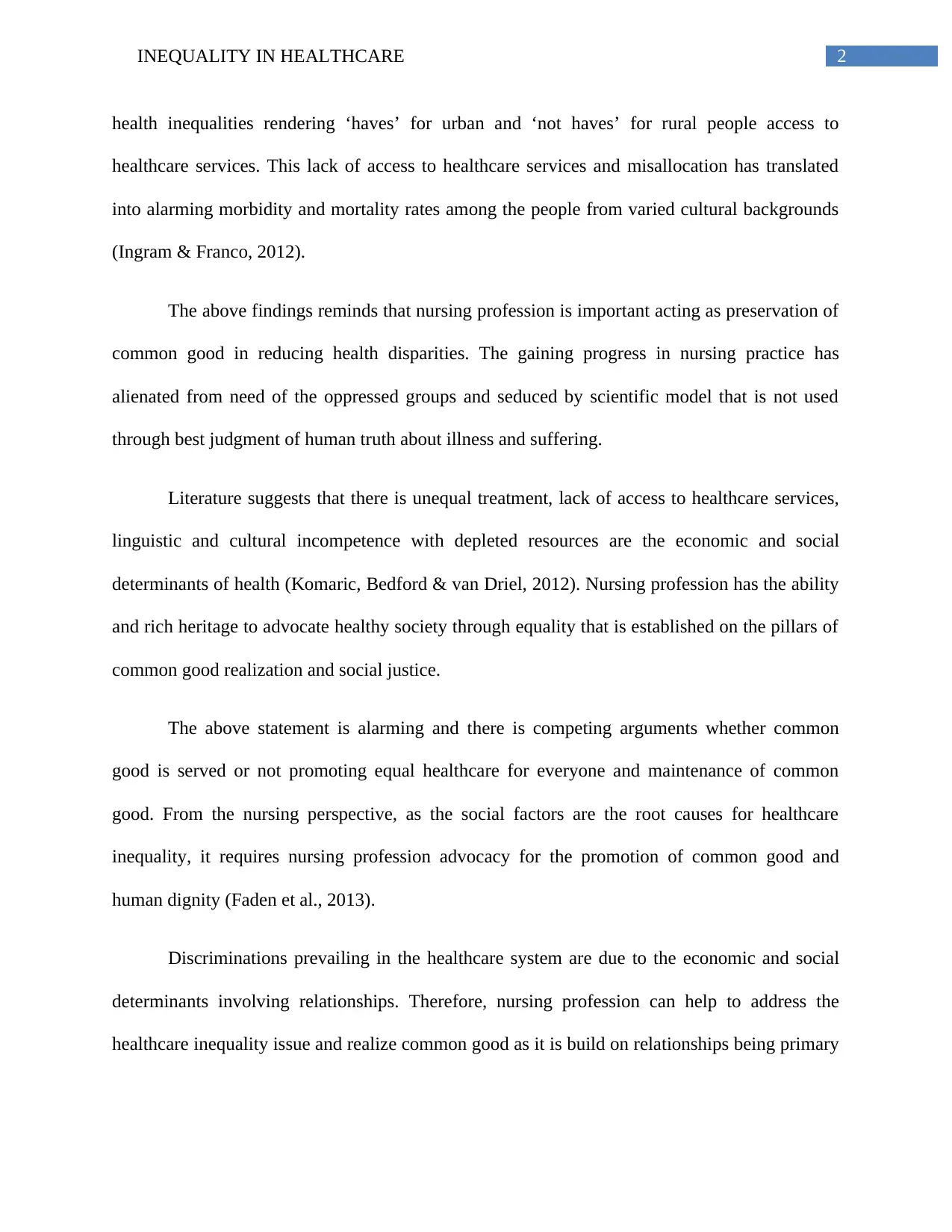
2INEQUALITY IN HEALTHCARE
health inequalities rendering ‘haves’ for urban and ‘not haves’ for rural people access to
healthcare services. This lack of access to healthcare services and misallocation has translated
into alarming morbidity and mortality rates among the people from varied cultural backgrounds
(Ingram & Franco, 2012).
The above findings reminds that nursing profession is important acting as preservation of
common good in reducing health disparities. The gaining progress in nursing practice has
alienated from need of the oppressed groups and seduced by scientific model that is not used
through best judgment of human truth about illness and suffering.
Literature suggests that there is unequal treatment, lack of access to healthcare services,
linguistic and cultural incompetence with depleted resources are the economic and social
determinants of health (Komaric, Bedford & van Driel, 2012). Nursing profession has the ability
and rich heritage to advocate healthy society through equality that is established on the pillars of
common good realization and social justice.
The above statement is alarming and there is competing arguments whether common
good is served or not promoting equal healthcare for everyone and maintenance of common
good. From the nursing perspective, as the social factors are the root causes for healthcare
inequality, it requires nursing profession advocacy for the promotion of common good and
human dignity (Faden et al., 2013).
Discriminations prevailing in the healthcare system are due to the economic and social
determinants involving relationships. Therefore, nursing profession can help to address the
healthcare inequality issue and realize common good as it is build on relationships being primary
health inequalities rendering ‘haves’ for urban and ‘not haves’ for rural people access to
healthcare services. This lack of access to healthcare services and misallocation has translated
into alarming morbidity and mortality rates among the people from varied cultural backgrounds
(Ingram & Franco, 2012).
The above findings reminds that nursing profession is important acting as preservation of
common good in reducing health disparities. The gaining progress in nursing practice has
alienated from need of the oppressed groups and seduced by scientific model that is not used
through best judgment of human truth about illness and suffering.
Literature suggests that there is unequal treatment, lack of access to healthcare services,
linguistic and cultural incompetence with depleted resources are the economic and social
determinants of health (Komaric, Bedford & van Driel, 2012). Nursing profession has the ability
and rich heritage to advocate healthy society through equality that is established on the pillars of
common good realization and social justice.
The above statement is alarming and there is competing arguments whether common
good is served or not promoting equal healthcare for everyone and maintenance of common
good. From the nursing perspective, as the social factors are the root causes for healthcare
inequality, it requires nursing profession advocacy for the promotion of common good and
human dignity (Faden et al., 2013).
Discriminations prevailing in the healthcare system are due to the economic and social
determinants involving relationships. Therefore, nursing profession can help to address the
healthcare inequality issue and realize common good as it is build on relationships being primary
⊘ This is a preview!⊘
Do you want full access?
Subscribe today to unlock all pages.

Trusted by 1+ million students worldwide
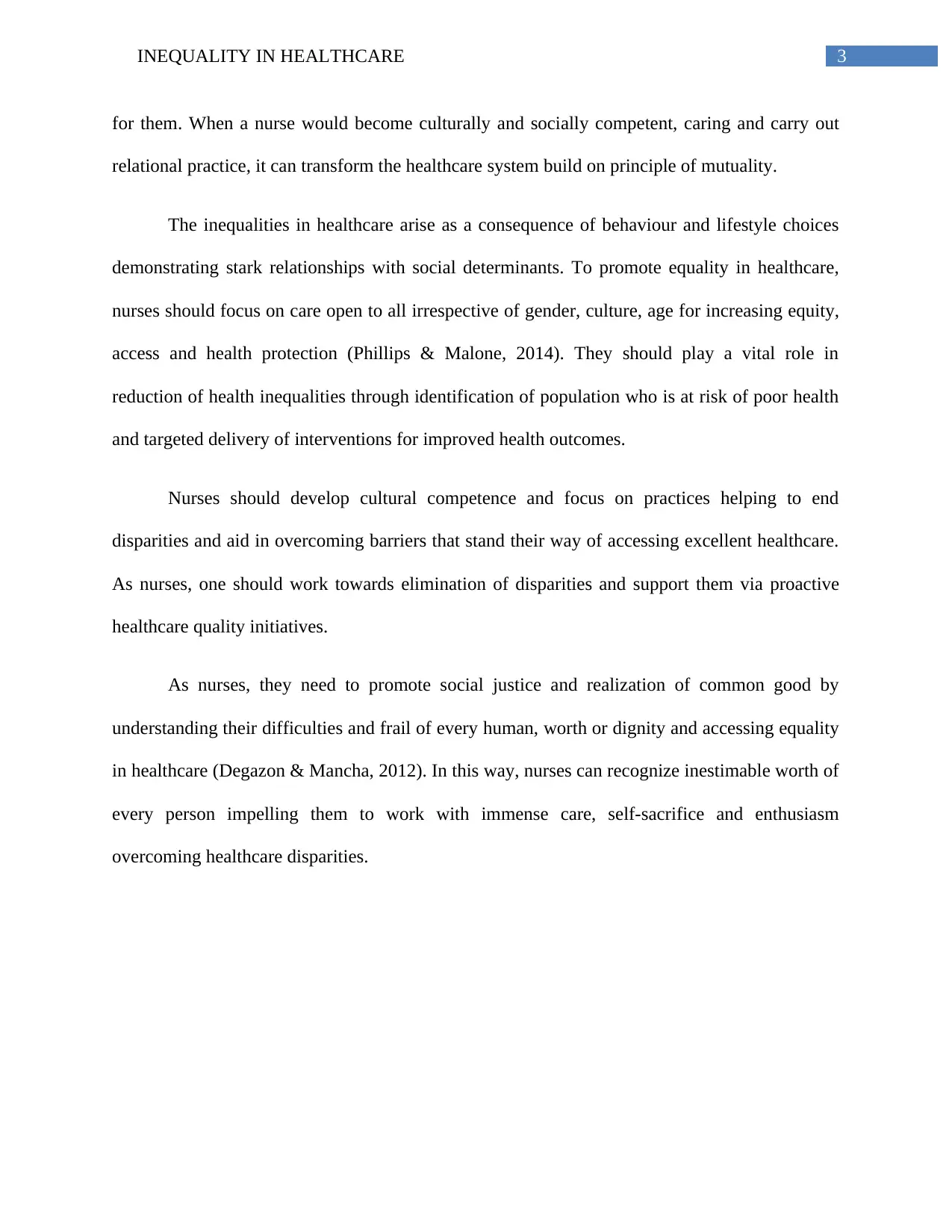
3INEQUALITY IN HEALTHCARE
for them. When a nurse would become culturally and socially competent, caring and carry out
relational practice, it can transform the healthcare system build on principle of mutuality.
The inequalities in healthcare arise as a consequence of behaviour and lifestyle choices
demonstrating stark relationships with social determinants. To promote equality in healthcare,
nurses should focus on care open to all irrespective of gender, culture, age for increasing equity,
access and health protection (Phillips & Malone, 2014). They should play a vital role in
reduction of health inequalities through identification of population who is at risk of poor health
and targeted delivery of interventions for improved health outcomes.
Nurses should develop cultural competence and focus on practices helping to end
disparities and aid in overcoming barriers that stand their way of accessing excellent healthcare.
As nurses, one should work towards elimination of disparities and support them via proactive
healthcare quality initiatives.
As nurses, they need to promote social justice and realization of common good by
understanding their difficulties and frail of every human, worth or dignity and accessing equality
in healthcare (Degazon & Mancha, 2012). In this way, nurses can recognize inestimable worth of
every person impelling them to work with immense care, self-sacrifice and enthusiasm
overcoming healthcare disparities.
for them. When a nurse would become culturally and socially competent, caring and carry out
relational practice, it can transform the healthcare system build on principle of mutuality.
The inequalities in healthcare arise as a consequence of behaviour and lifestyle choices
demonstrating stark relationships with social determinants. To promote equality in healthcare,
nurses should focus on care open to all irrespective of gender, culture, age for increasing equity,
access and health protection (Phillips & Malone, 2014). They should play a vital role in
reduction of health inequalities through identification of population who is at risk of poor health
and targeted delivery of interventions for improved health outcomes.
Nurses should develop cultural competence and focus on practices helping to end
disparities and aid in overcoming barriers that stand their way of accessing excellent healthcare.
As nurses, one should work towards elimination of disparities and support them via proactive
healthcare quality initiatives.
As nurses, they need to promote social justice and realization of common good by
understanding their difficulties and frail of every human, worth or dignity and accessing equality
in healthcare (Degazon & Mancha, 2012). In this way, nurses can recognize inestimable worth of
every person impelling them to work with immense care, self-sacrifice and enthusiasm
overcoming healthcare disparities.
Paraphrase This Document
Need a fresh take? Get an instant paraphrase of this document with our AI Paraphraser
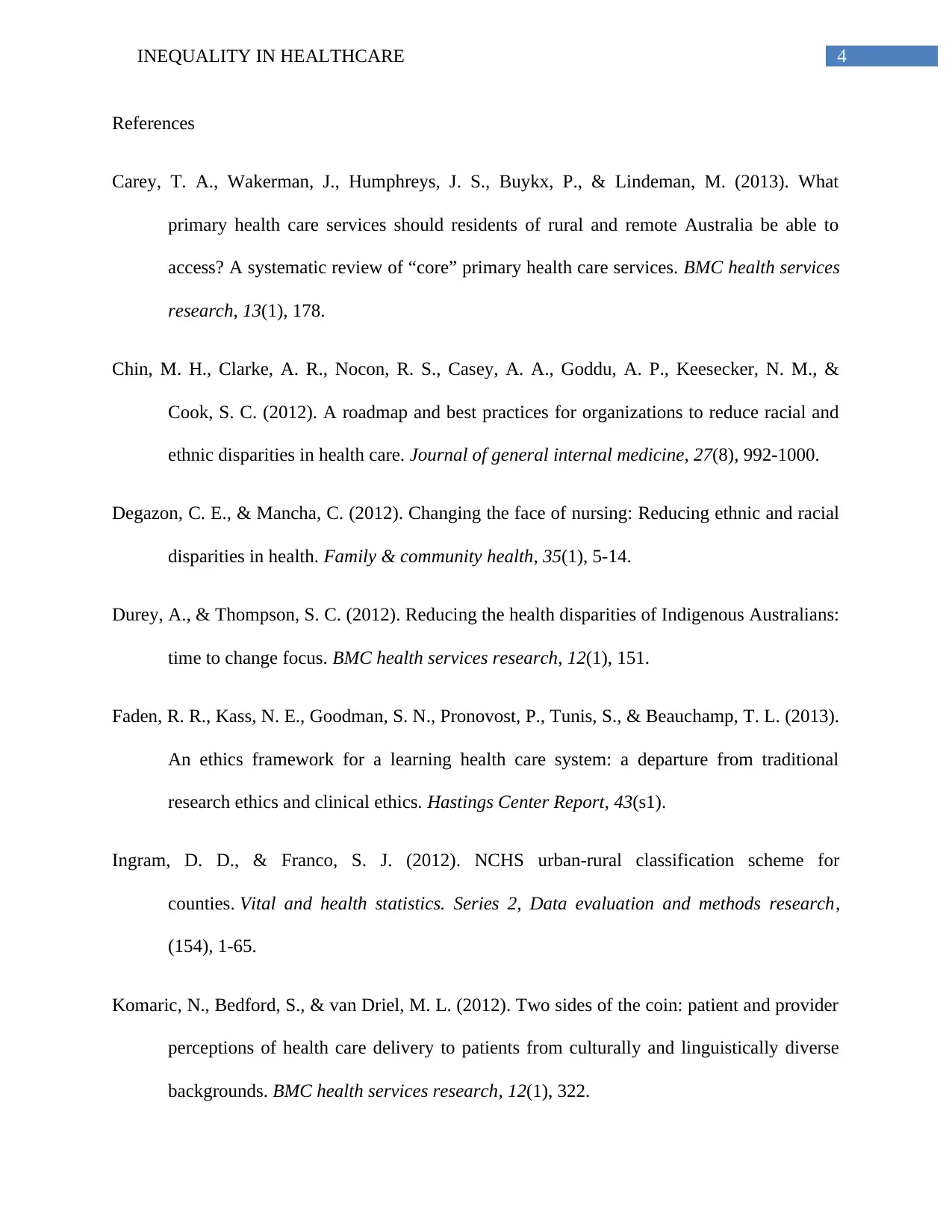
4INEQUALITY IN HEALTHCARE
References
Carey, T. A., Wakerman, J., Humphreys, J. S., Buykx, P., & Lindeman, M. (2013). What
primary health care services should residents of rural and remote Australia be able to
access? A systematic review of “core” primary health care services. BMC health services
research, 13(1), 178.
Chin, M. H., Clarke, A. R., Nocon, R. S., Casey, A. A., Goddu, A. P., Keesecker, N. M., &
Cook, S. C. (2012). A roadmap and best practices for organizations to reduce racial and
ethnic disparities in health care. Journal of general internal medicine, 27(8), 992-1000.
Degazon, C. E., & Mancha, C. (2012). Changing the face of nursing: Reducing ethnic and racial
disparities in health. Family & community health, 35(1), 5-14.
Durey, A., & Thompson, S. C. (2012). Reducing the health disparities of Indigenous Australians:
time to change focus. BMC health services research, 12(1), 151.
Faden, R. R., Kass, N. E., Goodman, S. N., Pronovost, P., Tunis, S., & Beauchamp, T. L. (2013).
An ethics framework for a learning health care system: a departure from traditional
research ethics and clinical ethics. Hastings Center Report, 43(s1).
Ingram, D. D., & Franco, S. J. (2012). NCHS urban-rural classification scheme for
counties. Vital and health statistics. Series 2, Data evaluation and methods research,
(154), 1-65.
Komaric, N., Bedford, S., & van Driel, M. L. (2012). Two sides of the coin: patient and provider
perceptions of health care delivery to patients from culturally and linguistically diverse
backgrounds. BMC health services research, 12(1), 322.
References
Carey, T. A., Wakerman, J., Humphreys, J. S., Buykx, P., & Lindeman, M. (2013). What
primary health care services should residents of rural and remote Australia be able to
access? A systematic review of “core” primary health care services. BMC health services
research, 13(1), 178.
Chin, M. H., Clarke, A. R., Nocon, R. S., Casey, A. A., Goddu, A. P., Keesecker, N. M., &
Cook, S. C. (2012). A roadmap and best practices for organizations to reduce racial and
ethnic disparities in health care. Journal of general internal medicine, 27(8), 992-1000.
Degazon, C. E., & Mancha, C. (2012). Changing the face of nursing: Reducing ethnic and racial
disparities in health. Family & community health, 35(1), 5-14.
Durey, A., & Thompson, S. C. (2012). Reducing the health disparities of Indigenous Australians:
time to change focus. BMC health services research, 12(1), 151.
Faden, R. R., Kass, N. E., Goodman, S. N., Pronovost, P., Tunis, S., & Beauchamp, T. L. (2013).
An ethics framework for a learning health care system: a departure from traditional
research ethics and clinical ethics. Hastings Center Report, 43(s1).
Ingram, D. D., & Franco, S. J. (2012). NCHS urban-rural classification scheme for
counties. Vital and health statistics. Series 2, Data evaluation and methods research,
(154), 1-65.
Komaric, N., Bedford, S., & van Driel, M. L. (2012). Two sides of the coin: patient and provider
perceptions of health care delivery to patients from culturally and linguistically diverse
backgrounds. BMC health services research, 12(1), 322.
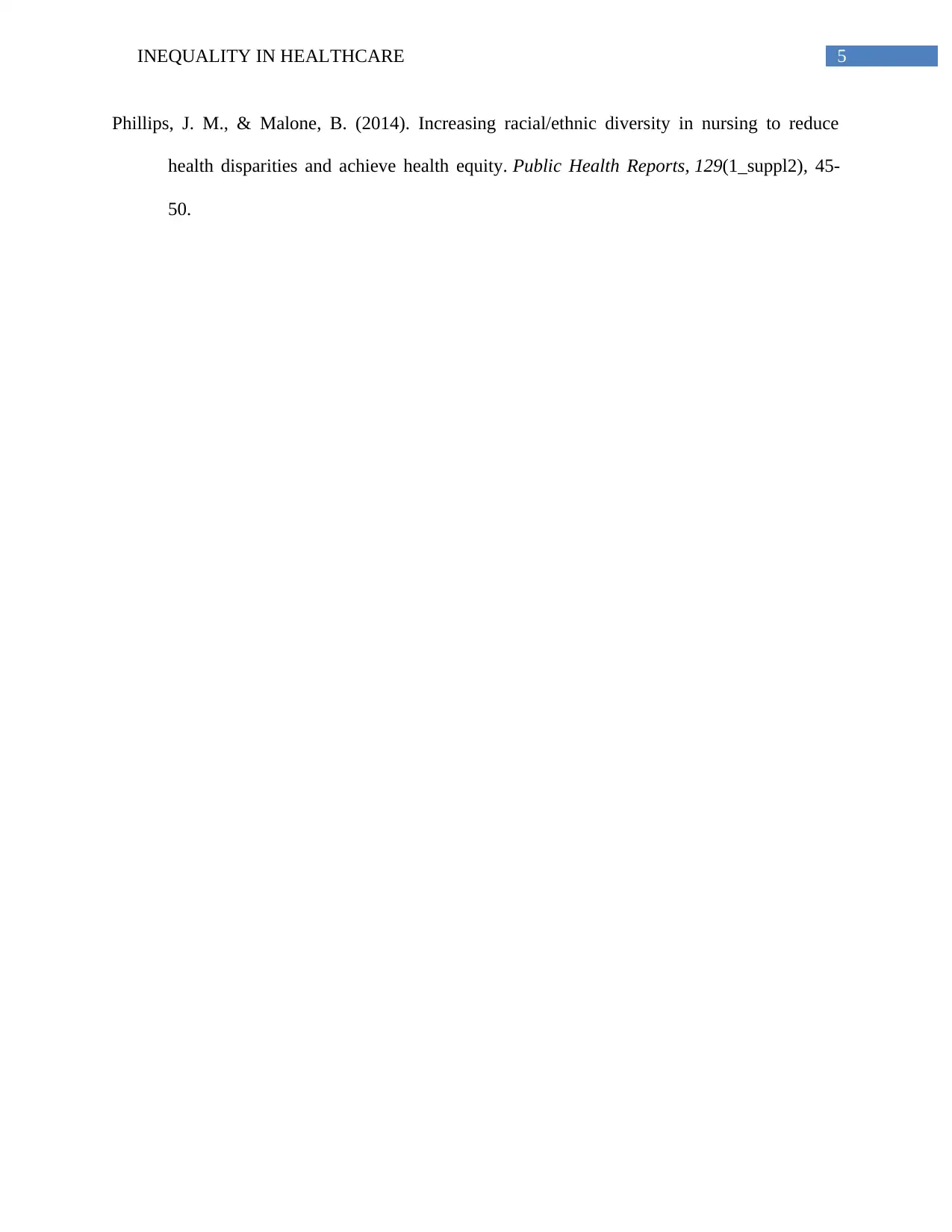
5INEQUALITY IN HEALTHCARE
Phillips, J. M., & Malone, B. (2014). Increasing racial/ethnic diversity in nursing to reduce
health disparities and achieve health equity. Public Health Reports, 129(1_suppl2), 45-
50.
Phillips, J. M., & Malone, B. (2014). Increasing racial/ethnic diversity in nursing to reduce
health disparities and achieve health equity. Public Health Reports, 129(1_suppl2), 45-
50.
⊘ This is a preview!⊘
Do you want full access?
Subscribe today to unlock all pages.

Trusted by 1+ million students worldwide
1 out of 6
Related Documents
Your All-in-One AI-Powered Toolkit for Academic Success.
+13062052269
info@desklib.com
Available 24*7 on WhatsApp / Email
![[object Object]](/_next/static/media/star-bottom.7253800d.svg)
Unlock your academic potential
Copyright © 2020–2026 A2Z Services. All Rights Reserved. Developed and managed by ZUCOL.





